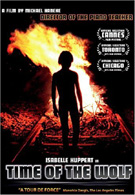There’s something about the end of the world that brings out the best in people. With all hope lost, people will reach out, and touch their fellow man... with a knife... in the back. At least that’s the feeling behind Time of the Wolf. Taking place at an unknown time, Time of the Wolf is an apocalypse tale which follows one family after an unknown cataclysmic event. As the family returns to their remote summer home after collecting supplies, they find another family claiming squatters rights. While the father, George, attempts to calmly settle the situation, the other family’s paternal figure shoots him dead. No threats, no negotiations, just bam - dead. With that we’re introduced to the stark reality of French writer/director Michael Haneke’s vision.
Without a home or father/husband, mother Anna (Isabelle Huppert), daughter Eva (Anaïs Demoustier), and son Ben (Lucas Biscombe) start to wander through the wilderness in seek of new shelter. Along the way Eva starts to befriend another wayward soul - a homeless boy whose name she never learns (played by Hakim Taleb). Eventually the group discovers a railway station where a collective of humans has camped out, waiting in hope that a train will come to take them to civilization. Not knowing what else to do, Anna and her children join in the waiting.
Although Time of the Wolf is an apocalypse story, it is not anywhere close to a science fiction film. Instead it is a social commentary, leaving the specifics of what happened quiet while focusing on the doubt instilled in the character’s new lives. The movie is set with a timelessness that means this armageddon could be several many years in the future, or these refugees could be survivalists during the Holocaust of World War II. That unknown factor is a great strength for the film, never straying from the human element to show a larger picture. It is to apocalypse films what Signs was for alien invasion movies. The individual is what’s important here.
However, that focus on the individual is also the film’s biggest weakness. There is no background information given on anyone. Who were these people before whatever happened took place? How have they managed to survive thus far? Why should we care about them? Without telling me anything about a character, you can’t expect me to have pity on them just because of their environment. Taking a little girl’s father away from her suddenly in the first act is not a reason to make me care for her in the third act. She needs to grow as a character, or at least have some background development. Instead, Haneke’s characters are bland, empty shells. The good side of that is the movie never goes for the “young optimistic girl who gets crushed by the weight of the world” or “young optimistic girl who’s Pollyanna outlook infects everyone around her” type story as it very easily could have gone. Unfortunately it just means the audience isn’t drawn to any of the characters, most of which never even get a chance to establish a name.
Often with movies of this type, if the characters don’t get you, sometimes the movie’s sometimes startling imagery will, and that’s where Time of the Wolf succeeds. Haneke does an admirable job of showing this brutal time. Horses are killed for their meat, their throats slit so the camera can catch the blood gushing from their bodies. Young Eva awakens to see a girl being raped at knifepoint inside the safe confines of the railroad station as the community sleeps around them. This is not a safe time, and bad people are out there, no longer held back from doing bad things. Even Eva’s newfound friend is a bit of a thief, and while Eva’s raising and family keep her from doing anything for survival, he is not above that. It’s a poignant social commentary within the movie, if you can stand through the choppy storytelling and bland characters to get to it. Because of that imagery, it’s also one of those movies that stays with you long after the credits roll, and keeps your thoughts coming back to the film until you finally realize what Haneke was trying to say. It’s just a shame he didn’t find a more clear way of saying it.
I’m still relatively fresh as a film critic, not yet having reached the point where everything I like has to be an independent film only seen by ten people and turning my nose up at summer blockbusters. As long as I’m still in touch with the common person’s movie tastes, it’s my job to express what I think the average moviegoer will like. Time of the Wolf is not that movie. That doesn’t make it a bad film, but it’s not going to appeal to the masses, but then that’s true of any foreign film. There’s just too large a crowd out there who doesn’t like to have to read their way through a movie (subtitles). With a lot of foreign films out there, I think that’s a shame. With Time of the Wolf, I say that’s fine. There are better ways of telling this type of story than to sit through this one. As would be expected, the extras on Time of the Wolf are a bit slim. That’s not to cut on its accomplishments. It’s just, with Foreign directors at the helm, stuff like commentary tracks are pretty much out of the question, unless you want to read a subtitled commentary track through your already subtitled movie.
There are two interviews however. One with writer/director Michael Haneke, and one with the film’s star Isabella Huppert, who previously worked with Haneke on The Piano Teacher. Haneke’s interview rubbed me the wrong way. While I applaud his efforts with Time of the Wolf, he’s one of those directors who believes in not having a clear definition of his film. He flat out says in the interview that if he were to present a clear ideal of what the movie is about, that would be giving the audience a guide to watching his film instead of just giving the audience the picture. Personally, I don’t agree with that Lynchian mode of thinking. If you don’t want to define your movie, figure out a clever way to do that while keeping it an interesting and intriguing tale (a la Donnie Darko). Because there’s no definite message or theme to the movie, the film as a whole suffers. Keep your story undefined by being clever, not by being intentionally vague.
Your Daily Blend of Entertainment News
There is a short look behind the scenes, but it’s not a typical documentary or featurette. It’s just five minutes of raw behind the scenes footage where someone had a camera on set and recorded the movie being made. It’s a short glimpse at filmmaking without any narration or real construction to it, which means, like the film, it has no real narrative. It’s an interesting choice to present the material, but not worth more than just a brief look.
To the film’s credit, the trailer is included, although it makes this look like a very different movie. It plays up one of the film’s semi-subplots (if you can call it that) - a conversation between some of the refugees about a religious collective called “The Just” who keeps the world going. While this does factor into the film, it’s not what the movie is about. Of course, with a film that has a pretty much undefined story and weak characters, I don’t know what else you would sell with the trailer.
While Time of the Wolf has stayed in my thoughts after viewing the film, I still consider it a disappointment. There is far too much potential in this type of story to handle a film like this. Perhaps it’s something about French storytelling, a way of telling the story that relates to the French people more than Americans, and that every blink or finger movement carried tons of messages I missed out on, but I seriously doubt it. For the few who would be intrigued by this film, you can let Time of the Wolf tick on past.

